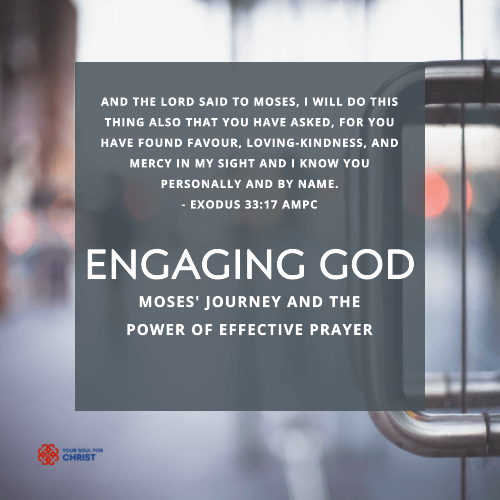And the Lord said to Moses, I will do this thing also that you have asked, for you have found favour, loving-kindness, and mercy in My sight and I know you personally and by name.
Exodus 33:17 AMPC
When God conveyed to Moses that He wouldn’t accompany them to the promised land, it wasn’t a test or a divine prank. Moses engaged with God in the right manner, showcasing the profound power of prayer Imagine if it were someone less persistent; they might have accepted an angelic escort and moved on without God’s presence. I can imagine if it were to a man like Eli, he’d probably say: “well, you are God and you know the best, if this is what you plan to do, there’s no problem at all, at least you are sending an angel with us and since you also promised victory, we will go.”
Many burdens persist because we fail to seek God appropriately. Those who become significant in the Lord’s hands are those who pray right, at the right time. Moses’ plea not to be sent without God’s presence was pivotal; it secured the nation’s entry into the promised land. Gratefully, we have the privilege of prayer, allowing us to call on God with the assurance that He will answer.
Likewise, in Genesis 19, when the angels sought to rescue Lot and his family from Sodom’s impending judgment. They advised fleeing to the mountains, but Lot, recognizing the challenge, pleaded to escape to a nearby town. God, attentive to sincere requests, spared the town. This narrative emphasizes the power of prayer in altering outcomes.
Your servant has found favour in your eyes, and you have shown great kindness to me in sparing my life. But I can’t flee to the mountains; this disaster will overtake me, and I’ll die. Look, here is a town near enough to run to, and it is small. Let me flee to it—it is very small, isn’t it? Then my life will be spared.” He said to him, “Very well, I will grant this request too; I will not overthrow the town you speak of. But flee there quickly, because I cannot do anything until you reach it.” (That is why the town was called Zoar.)
Genesis 19:19-22 NIV
Prayer is a privilege, and it demands persistence. The name of Jesus grants us unlimited access to heaven. We must persist in asking until we receive, seek until we find, and knock until doors open. Matthew 7:7 encapsulates the essence and power of persistence in prayer.
Ask and keep on asking and it will be given to you; seek and keep on seeking and you will find; knock and keep on knocking and the door will be opened to you.
Matthew 7:7 AMP
Additionally, in your prayer life, aligning motives with God’s will is paramount. James 4:3 warns against wrong motives, rooted in selfishness or unrighteous agendas. God is as interested in our motives as in our prayers. Aligning our desires with God’s will, as exemplified in the Lord’s Prayer, ensures prayers are answered. We must be helplessly and completely dependent on God.
This privilege of moving God into action is prayer—specifically, what you ask. Not complaints, not murmurs, but what you ask God personally. Also, it is about your request, not a request on your behalf. God’s response to Moses clearly states that God was willing to do what Moses asked for. So, what do you ask for? The story of Moses teaches us that God responds to what we personally ask for.
If there is a man to pray, there is a God to answer. Moses prayed that God should not send them without His presence and the bible tells us that he got what he asked for. “And the Lord said to Moses, I will do this thing also that you have asked”. God has many other things to accomplish, and, in addition, He will also fulfil what Moses requested. In our lives, prayer is essential for divine visitation. Engage God with your requests, turning to Him instead of complaining or seeking answers elsewhere. God waits for your call; there’s power in engaging Him through prayer.
However, a crucial aspect led to God responding positively to Moses. God told Moses: “for you have found favour, loving-kindness, and mercy in My sight and I know you personally and by name”. Similarly, in Genesis 6:8, Noah found favour in God’s sight, preserving him from destruction. Our righteousness and grace are intertwined. Furthermore, God testified of Moses that He knew him personally and by name – a testament to Moses right standing before God. A personal relationship with God is the basis of effective prayer. John 9:31 reinforces this: “We know that God does not listen to sinners; but if anyone is God-fearing and a worshiper of Him and does His will, He listens to him.” (AMPC)
Do you have a relationship with God? The name of Jesus isn’t a magic wand; access to heaven is for those whose names are written in the book of life. Therefore, you must ensure your relationship with God is not based on assumptions. If uncertain, come to God in repentance, seek forgiveness, express the desire to know Him, and believe in Jesus’ work.
In summary, the power of prayer lies in personal engagement with God, persistence, aligning motives with His will, and maintaining a righteous relationship. Understanding these principles transforms prayer from a routine to a powerful connection with the Almighty.




